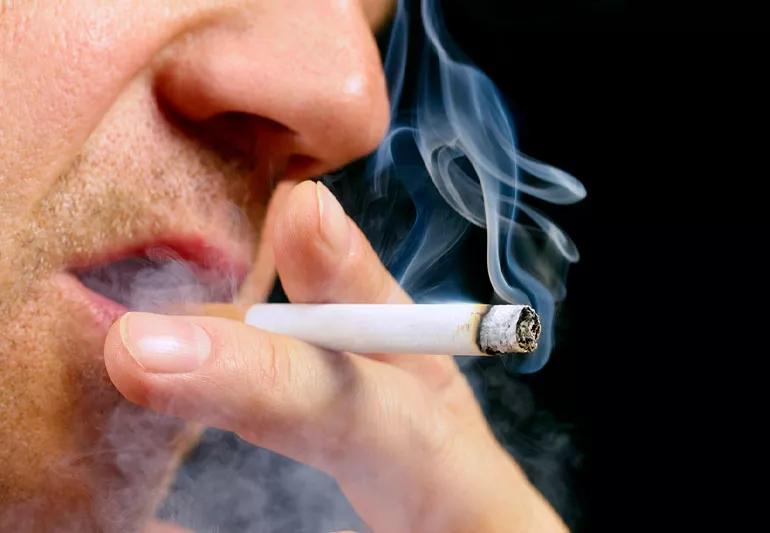Smoking before surgery puts you at risk for death and other complications

Image content: This image is available to view online.
View image online (https://assets.clevelandclinic.org/transform/9e5b8980-ef23-4147-a2a5-24bcd635b0b2/smokingSurgery-90902963-770x533-1_jpg)
man smoking cigarette
The list of benefits that goes along with quitting smoking goes on and on, including reducing your risk of cancer, heart disease and early death. But what happens when you’re a smoker but have an upcoming surgery and your doctor tells you to quit right away?
Advertisement
Cleveland Clinic is a non-profit academic medical center. Advertising on our site helps support our mission. We do not endorse non-Cleveland Clinic products or services. Policy
Now is a better time than ever to stop smoking.
“Smoking before surgery puts you at a higher risk for postoperative heart attacks, blood clots, pneumonia and even death,” says pulmonologist Humberto Choi, MD. “When I schedule surgery, I tell my patients they should stop smoking right away.”
Even though it’s easier said than done, quitting smoking can make a huge difference in your health and recovery from surgery. In fact, the longer you abstain from smoking, the better your chances of a healthy recovery, among other benefits.
One JAMA study compared post-surgery risks for 125,000 smokers, 78,000 former smokers (who quit at least a year before surgery) and 400,000 nonsmokers. In comparing smokers with former smokers, researchers found smokers were 17% more likely to die and 53% more likely to have serious heart and lung problems.
Yet former smokers who had quit at least a year before surgery had no increased risk of death compared to nonsmokers.
“You should do your best to avoid cigarette smoke before surgery,” says Dr. Choi. “Secondhand smoke can cause coronary heart disease, stroke and lung cancer.”
Dr. Choi explains why smoking before surgery is risky:
The anesthesia team can tell immediately if the patient is a smoker.
Advertisement
“Anesthesiologists have to work harder to keep smokers breathing while under anesthesia, fighting against lungs compromised by cigarette smoke,” says Dr. Choi. “That makes it more likely that bronchodilator medications like albuterol must be used.”
The American Society of Anesthesiologists reports that smoking reduces blood flow and your surgical incisions are more likely to become infected since it slows healing.
Smoking compromises heart function, putting a patient at a greater risk for heart problems during or after surgery. That same JAMA study found smokers had a 77% greater risk of heart attack after surgery than nonsmokers.
Tobacco harms your heart and blood vessels. They disturb normal heart rhythms, contribute to inflammation and increase your blood pressure and heart rate. Not only that, but smoking increases your risk of heart failure, heart attack and dying from heart disease.
Carbon monoxide in a smoker’s body robs tissues of the oxygen they need to heal. The toxins in the blood of smokers also permeate the tissue, which further compromises the healing process. If you don’t quit smoking before surgery, you may be at higher risk for infections since oxygen is the main source for healing wounds.
Even if you quit 24 hours before your surgery, that can increase the amount of oxygen in your body. No matter if you’re a new smoker or you’ve smoked for 20 years, it’s still crucial to quit smoking on matter what.
The good news is that an upcoming surgery can be just the motivation a smoker needs to finally kick the habit. Quitting tobacco is always a good idea, and your upcoming surgery can be just what the doctor ordered. Talk to your doctor about resources that can help you quit smoking as soon as possible.
“Surgery is a great time to quit,” says Dr. Choi. “When I talk through the risks of pneumonia, heart attack and death, it helps patients understand the increased risks they face and highlights how they can improve their outcome.”
Advertisement

Sign up for our Health Essentials emails for expert guidance on nutrition, fitness, sleep, skin care and more.
Learn more about our editorial process.
Advertisement
You might think it’s fine, but your teeth and jaw beg to differ
Kick the harmful habit with these tips
Quitting has many benefits in the cancer fight
5 tips to stub out cigarettes without the extra pounds
Whether you’re trying to work out more, drink less or manage stress, we can help set you up for success
Severed milk ducts or lost glandular tissue may affect your milk production
Blood flow can benefit from leg elevation and even low-impact exercise, like walking
Larger polyps can be difficult to remove, but there are options
Type 2 diabetes isn’t inevitable with these dietary changes
Applying a hot or cold compress can help with pain
Pump up your iron intake with foods like tuna, tofu and turkey